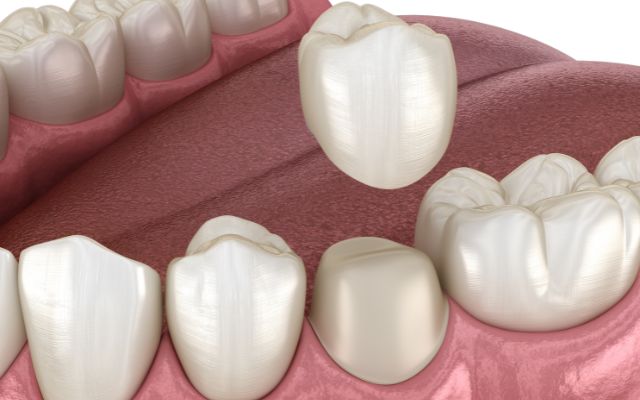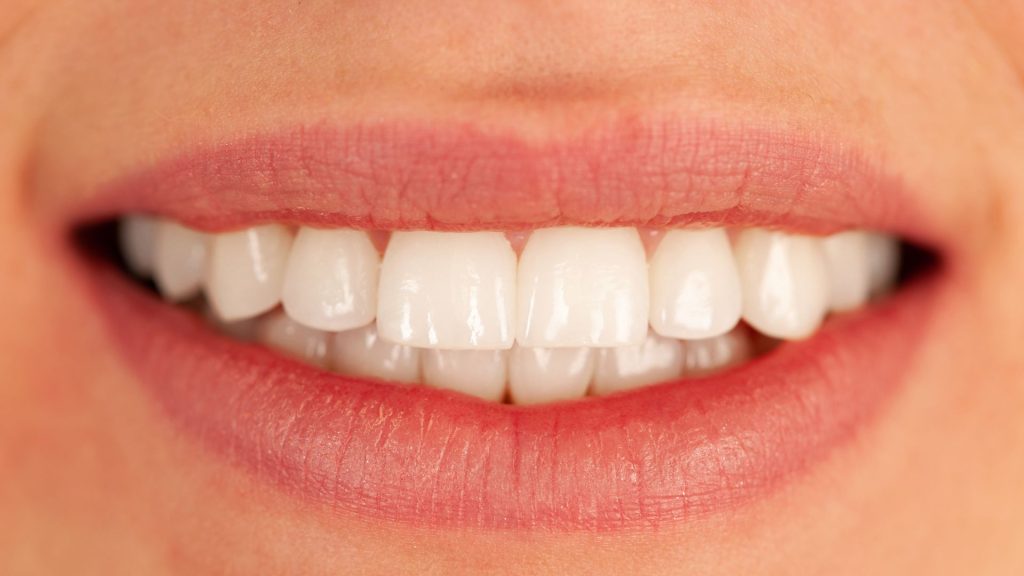Dental Crowns
Dental Crowns Bassendean, Perth
At Spring Orchid Dental in Bassendean, Perth, our skilled dentists can rejuvenate your smile with custom-made dental crowns, ideal for teeth that are excessively worn or decayed. These durable and natural-looking crowns serve as a protective cap over damaged teeth, enhancing both function and appearance. Using advanced materials and techniques, we ensure your crowns blend seamlessly with your natural teeth. Experience exceptional dental care at competitive prices. Visit Spring Orchid Dental for affordable dental crowns and enjoy a healthier, more confident smile.

What are Dental Crowns/Teeth Caps?
A dental crown, or cap, is a custom-made cover that fits over a tooth to restore its shape, size, strength, and appearance. Once cemented in place, it fully encases the visible part of the tooth above the gum line, offering protection and an improved look.
Crowns are often used when a tooth is significantly damaged, decayed, or discolored, and other treatments like fillings aren’t sufficient. Made from materials such as porcelain, ceramic, metal alloys, or gold, crowns provide a durable and aesthetic solution.
In addition to restoring function, crowns can enhance the appearance of discolored or misshapen teeth. They are a versatile option that can last for many years with proper care.
When Should I Get A Dental Crown?
A dental crown is a versatile solution used in various situations to restore and protect your teeth. You might need a dental crown if:
- Restoring a Broken or Fractured Tooth: If a tooth is already broken or severely worn down, a crown can restore its function and appearance.
- Protecting a Weak Tooth: Crowns can protect a tooth that’s at risk of breaking or hold together parts of a cracked tooth, especially if it’s been weakened by trauma.
- Safeguarding a Tooth After Root Canal Treatment: Teeth can become brittle after a root canal, making them more prone to fractures. A crown provides essential protection.
- Supporting a Dental Bridge: Crowns are often used to hold a dental bridge in place, ensuring stability and functionality.
- Covering a Tooth with a Large Filling: When a tooth has a large filling and not much natural tooth structure left, a crown can cover and support it effectively.
- Replacing a Missing Tooth with a Dental Implant: Crowns are used to cover dental implants, seamlessly replacing a missing tooth.
- Cosmetic Enhancements: If you have misshapen or severely discolored teeth, crowns can provide a significant cosmetic improvement, giving you a more attractive smile.
Why Choose Spring Orchid Dental for Crowns?
Expert Care
Our experienced dentists provide high-quality crowns that are durable, functional, and natural-looking.
Advanced Technology
We use the latest dental technology and materials to ensure your crowns are precise and long-lasting.
Patient Comfort
We prioritize your comfort during the crown procedure, offering a relaxed and stress-free environment.
Affordable Pricing
We offer competitive pricing without compromising on quality, making dental crowns accessible for everyone.
Restore Your Smile with a Custom Dental Crown!
Is your tooth damaged, worn, or in need of protection? A custom dental crown could be the perfect solution. Our skilled team at Spring Orchid Dental is ready to help you achieve a healthier, more confident smile.
Call Now (toll free)
08 6155 8999
Dental Crown Procedure

First Visit: Getting The Molds To Make New Crowns
The first visit is to obtain the molds for making new crowns.
In order to ensure that your new crown will fit and bite properly with the other teeth in your mouth, your first appointment will include taking numerous very accurate molds (or impressions) of the tooth along with the rest of your mouth. These molds (or impressions) will be used to make your bespoke crown.
- Make the first molds for temporary crowns.
Until your new crown is made by a dental laboratory, a temporary crown made from the initial mold will be placed on your tooth and remain there for around two weeks. - Getting the tooth ready for temporary crowns.
The dentist will clean out any decay and shape the surface of the tooth to provide a good fit for the crown while the tooth is still numb. - Permanent Crown Molds
Once the tooth has undergone the last stage of preparation, a new crown can be firmly affixed to it. A unique Australian-made crown is created using these second molds, which are delivered to our dental laboratory in accordance with our dentist’s specifications. - Putting on Temporary Crowns
After completing these steps, your temporary crown will be cemented to your teeth with temporary cement, and your bite will be examined to make sure you are biting correctly.
Second Visit: Placing The Permanent New Crowns
Your permanent crown will be available for you to try in about two weeks, and if it fits, it will be permanently set in place.
Once the tooth has been cleaned and your temporary crown has been removed, you can try your new permanent crown. It will be carefully positioned to guarantee proper spacing and bite. Once it fits and is properly set in place, you will have a brand-new, functional tooth.
You will be given care instructions and encouraged to visit the dentist on a regular basis to have your new crown checked.
Your visit will be short and very comfortable, We won’t ever rush you out of the office, and you can rest assured that Spring Orchid Dental treatments will give you a reason to smile again.
“Crown Treatment Should Never be Delayed.”
Putting off treatment for a dental crown can allow weak tooth enamel to break apart, exposing the nerve or even fracturing the tooth beyond repair.
If you suspect that your tooth has broken, or you have had a filling fall out, please call our office at your earliest convenience.
The quicker you seek out treatment, the more likely you are to be able to preserve your tooth health.
Spring Orchid Dental can custom create a crown to suit perfectly your smile, whether you want longevity, strength, or the most natural aesthetic look.
Crowns are quite useful in their use. One of its most essential purposes is to enable patients to restore and thereby retain their original teeth. They can also perform incredible cosmetic alterations.
Please contact us for a consultation if you’re interested in learning more about how a crown might improve your smile.
Secure Your Smile with Our Dental Crowns Bassendean
6/85 Walter Rd E Bassendean WA 6054
FAQs
How Long Do Dental Crowns Last?
A well-cared-for dental crown normally lasts for 15 years on average. However, when properly cared for, they can endure for up to 25-30 years.
Can You Get Decay Under A Crown?
Poor oral hygiene might lead to tooth decay beneath a crown. You may increase your chance of getting decay by skipping out on basic oral hygiene practices like brushing and flossing your teeth. It is crucial that you visit the dentist periodically to get your teeth examined and cleaned.
Is It Painful To Get A Crown?
Due to anesthesia and sedation, receiving a crown is not painful; a patient can suffer some little discomfort.
Is It Better To Pull A Tooth Or Get A Crown?
It is always preferable to use a dental crown to save your tooth.
If your dentist advises a dental crown instead of an extraction, you should follow their advice. It’s preferable to preserve your native tooth with a dental crown whenever possible. It’s more advantageous and more affordable, as well as quicker.
Why Is It Black Around My Crown?
A dental crown’s composition is typically the cause of a black line that surrounds it. A lot of crowns are made of metal and porcelain fused together (PFM). These crowns are made of porcelain and have a hard metal shell inside.
Where Are Dental Crowns Made?
A dental laboratory receives the imprints that were taken. The laboratory crafts the crowns and, after approximately two to three weeks, delivers them back to the dental practice where they were ordered.
What are some effective alternatives to dental crowns?
There are several alternatives to dental crowns, including:
1. Fillings: Ideal for small cavities.
2. Inlays and Onlays: Used for larger areas of decay, providing strength while preserving more tooth structure.
3. Veneers: Thin shells for cosmetic improvements, mainly on front teeth.
4. Dental Bonding: Good for minor repairs like chips and gaps.
5. Bridges: Used to replace missing teeth, often involving crowns on adjacent teeth for support.
Choosing the right option depends on the extent of tooth damage and aesthetic goals. Contact our dentist today to discuss which alternative is best for you!





